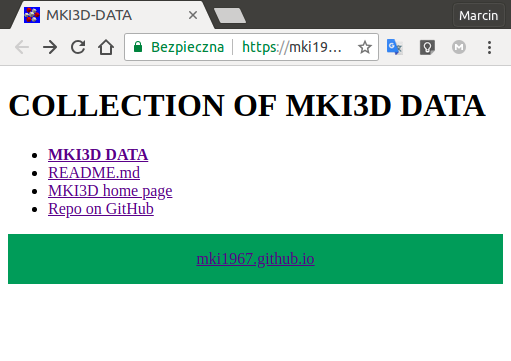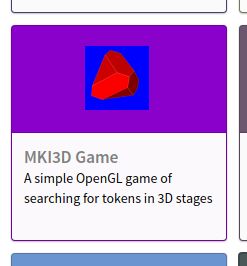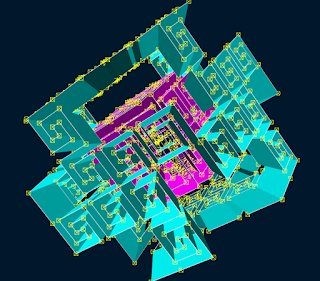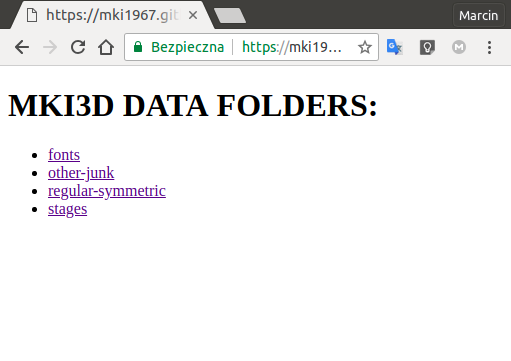The version 2.0 of MKISG Android app has a new (memory-less) interface and colorful sky-boxes.
This is interface (the same as in MKI3D TRAVELER and MKI3DGAME) has separate sectors for moving and for rotations, thus it should be more intuitive and easier to use ...
Tutorial posts and news about mki3d program for designing simple 3D models made of colored segments and triangles in web-browsers. Mki3d is available for downloading and ready to use on-line at: https://mki1967.github.io/mki3d/
Sunday, October 21, 2018
Friday, September 28, 2018
Linking MKI3D stages into webs of stages
URL links in the MKI3D editor
In the recent version of MKI3D you can place URL links in your designed stages that can be followed when the stage is browsed in MKI3D TRAVEL.
The link symbol in the MKI3D editor looks like that:
Like the selected and bookmarked points, the link symbols are displayed in the current cursor's color, and are always facing the observer.
URL submenu
There is a new position 'U' on the main menu:This is for creating and manipulating URL links. At present, the URL submenu looks like that:
You can add a new empty link at the cursor position by pressing the 'A' key on this submenu.
(There is a minimal distance required between any two links positions.)
The edit ('E'), cut ('X') and paste ('V') actions are performed on the link at cursor position.
There is a new option 'U' at the cursor submenu, the moves the cursor to the position of the nearest link.
Edit URL submenu
The editing of link is done in the following submenu:The textfields on Edit URL submenu
There are three input text fields for: LABEL, OPENER, and URL.LABEL may be any any text. It is prominently displayed in the MKI3D TRAVEL, when the user is offered to follow the link.
OPENER and URL are used to construct the actual URL of the page that is opened by the link.
If OPENER and URL are full (i.e. not relative) URLs, then they are simply concatenated.
The result should be a legal full URL that can be opened by the browser.
For example if:
- OPENER is 'https://mki1967.github.io/mki3d/mki3d_www/mki3d.html?input=', and
- URL is 'https://mki1967.github.io/mki3d-data/data/web/stage1.mki3d',
https://mki1967.github.io/mki3d/mki3d_www/mki3d.html?input=https://mki1967.github.io/mki3d-data/data/web/stage1.mki3d
("actual opener URL" or "actual input URL", respectively).
Then the concatenation of "actual opener URL" with "actual input URL" is the URL to be opened by the browser.
The construction is made with the URL() constructor ,
where a different "base URLs" are used for OPENER and URL
( "opener URL base" and "input URL base", respectively).
Computing "actual input URL" from URL
The "actual input URL" is made from the URL with the "input URL base",if the URL is a relative URL.
If the the MKI3D editor or in the MKI3D TRAVEL were opened with the parameter '?input=' ,
then the "input URL base" is the URL of the loaded stage.
(The value of the parameter '?input=' may also be an relative URL. In such case, the "input URL base" is the URL of the document.referrer - the URL of the page from which it is opened.)
Thus the relative URL links in the stage are assumed to have the same base as the stage itself. (This enables desingnig and testing of local webs with the http://localhost server and then publishing them e.g. by pushing on public static pages such as GitHub Pages.)
Computing "actual opener URL" from OPENER
If the OPENER is empty the the "actual opener URL" is also empty.In MKI3D TRAVEL and in MKI3D editor the "opener URL base" is taken from
window.location.href, thus the OPENER from the link is assumed to have the same base as the current opener of the stage.
Note that
- https://mki1967.github.io/mki3d/mki3d_www/mki3d.html and
- https://mki1967.github.io/mki3d/mki3d_www/travel.html
have the same url base.
Thus, if you are working in the editor open from the URL:
https://mki1967.github.io/mki3d/mki3d_www/mki3d.html
and if the link has:
- OPENER : 'travel.html?input=', and
- URL : 'https://mki1967.github.io/mki3d-data/data/web/stage1.mki3d',
https://mki1967.github.io/mki3d/mki3d_www/travel.html?input=https://mki1967.github.io/mki3d-data/data/web/stage1.mki3d
On the other hand, if the editor were open from URL:
http://localhost:8000/mki3d/mki3d_www/mki3d.html
then the actual URL to be opened by such link would be:
http://localhost:8000/mki3d/mki3d_www/travel.html?input=https://mki1967.github.io/mki3d-data/data/web/stage1.mki3d
This is useful if you want to work with applications served by the http://localhost server
from your local clones of MKI3D repo.
(You may follow the hints from README.md of the mki3d-data repo.)
Probably, you would like to have the links with the short relative URLs, like:
- OPENER: 'travel.html?input=', and
- URL: 'stage1.mki3d'
Remainig options of URL Edit submenu
The 'Tab' key on the submenu lets you test what would be opened with the current values
of OPENER and URL.
Note that the the actual URL opened by the link with relative URLs depends on how the editor was started.
The 'X' and 'V' keys let you cut the link and then paste it in the cursor positions. This is useful if you want to remove the link, or to make many copies or similar links.
Stages in the MKI3D editor vs. the stages in the MKI3D TRAVEL.
Stages browsed in MKI3D TRAVEL the are designed in the MKI3D editor .
The entry point to the stage in the MKI3D TRAVEL is where the cursor was left in the MKI3D editor .
The observer is aligned with X,Y,Z axes looking into positive Z direction.
To see the orientation in MKI3D editor , you should see the cursor like that:
The scaling from MKI3D editor is not applied in MKI3D TRAVEL. To see the size of the stage in MKI3D editor set CURSOR STEP to 1 on the Inputs Page ('QI').
INDEX OF MKI3D WEB
I have just created a HTML page on GitHb Pages that is intended to contain a list of links that are entries to the web of MKI3D stages. The address of the page is: https://mki3d.github.io/mki3d-web-index/
If you want to submit such link to your stage the please read and follow the simple instructions in
README.md. (I short: you just have to open new issue containing the URL that opens your stage in MKI3D TRAVEL.)
README.md. (I short: you just have to open new issue containing the URL that opens your stage in MKI3D TRAVEL.)
Tuesday, September 25, 2018
Webs of 3D Stages
The recent version of MKI3D let you insert URL links into your 3D designs.
Now you can design webs of 3D stages and your web browsing can be just travelling between the 3D stages and normal HTML pages.
I have just added MKI3D TRAVEL PWA that is a kind of browser for MKI3D stages.
You can navigate by clicking/touching the screen sectors and follow or ignore the URL links of the aproached link symbols.
At this moment I have just created an example web (reachable from the TRAVELER) by adding some links to the stages of my games.
I will soon prepare a post with more informations about URL links in MKI3D and how to build your own webs of stages ...
Now you can design webs of 3D stages and your web browsing can be just travelling between the 3D stages and normal HTML pages.
I have just added MKI3D TRAVEL PWA that is a kind of browser for MKI3D stages.
At this moment I have just created an example web (reachable from the TRAVELER) by adding some links to the stages of my games.
I will soon prepare a post with more informations about URL links in MKI3D and how to build your own webs of stages ...
Monday, September 10, 2018
I have just updated drawing of selected and bookmarked endpoints. (I have noticed that the procedure was extremaly inefficient.) If you are using PWA version, then you need to restart MKI3D twice (the first time on-line) for the changes to have effect.
Tuesday, August 21, 2018
New Game Stage
A new stage has been added to mki3dgame and MKI SG PWA.
Now the games have 20 stages.
Happy playing !
Saturday, August 18, 2018
COLLECTION OF MKI3D DATA
It is not easy to invent meaningfull names for the files containing 3D designs and then to remember what is stored in the file, given its name only.
I am saving my *.mki3d files on disk in a folder that is being synchronized with a cloud, such as Dropbox or MEGAsync. So far, to recollect what is contained in the file, I had to load it to MKI3D Editor using the file load submenu ('QFLF...'), which is a time consuming action.
Now, since MKI3D can open data from URL given as input parameter, I am using bash scripts to build a simple local web site ( HTML index files ) and a simpe local server (written in Go) that let the web site be displayed in the web browser.
The HTML index files are created so that when you click on the file name, the file is being opened in the MKI3D editor in the browser.
I have also made the web-site into git repository and pushed it to GitHub and then (in the settings) I made it visible as GitHub Pages.

The MKI3D DATA is organized in two-level hierarchy. On the first level there are folders:
Each folder contains a list of files:
When you click on the file on the list, its contents is opened in MKI3D editor:

This is ready to use solution, if you work on Linux system with bash and installed Go compiler.
(I think, for other systems the analogous solutions could be created.)
The workflow is following:
You also have an (easy) option to publish your data on GitHub Pages.
I am saving my *.mki3d files on disk in a folder that is being synchronized with a cloud, such as Dropbox or MEGAsync. So far, to recollect what is contained in the file, I had to load it to MKI3D Editor using the file load submenu ('QFLF...'), which is a time consuming action.
Now, since MKI3D can open data from URL given as input parameter, I am using bash scripts to build a simple local web site ( HTML index files ) and a simpe local server (written in Go) that let the web site be displayed in the web browser.
The HTML index files are created so that when you click on the file name, the file is being opened in the MKI3D editor in the browser.
I have also made the web-site into git repository and pushed it to GitHub and then (in the settings) I made it visible as GitHub Pages.

The MKI3D DATA is organized in two-level hierarchy. On the first level there are folders:
Each folder contains a list of files:
When you click on the file on the list, its contents is opened in MKI3D editor:

This is ready to use solution, if you work on Linux system with bash and installed Go compiler.
(I think, for other systems the analogous solutions could be created.)
The workflow is following:
- I start the server with the script: ./bin/run-local-server.bash.
- I open the printed URL http://localhost:8001/ in the web browser. (So, I can browse the indexed data.)
- Whenever I save a new mki3d file (or less frequently), I run the script ./bin/update.bash to update the HTML index files.
You also have an (easy) option to publish your data on GitHub Pages.
Wednesday, July 18, 2018
URLs for Opening MKI3D with Loaded Input Data
The new version ( v0.20 ) of MKI3D PWA can be used to display your mki3d designs in the browser.
You can create links on your pages that can open the MKI3D editor with loaded content.
The link consists of the address of the application 'https://mki1967.github.io/mki3d/mki3d_www/mki3d.html' with a parameter 'input' in its query string, which is an URL of the mki3d data file.
Here are some examples of links to the stages of mki3dgame directly on the GitHub:
- https://mki1967.github.io/mki3d/mki3d_www/mki3d.html?input=https://raw.githubusercontent.com/mki1967/mki3dgame/master/assets/stages/MKI3D-stage-1.mki3d
- https://mki1967.github.io/mki3d/mki3d_www/mki3d.html?input=https://raw.githubusercontent.com/mki1967/mki3dgame/master/assets/stages/stage9.mki3d
- https://mki1967.github.io/mki3d/mki3d_www/mki3d.html?input=https://raw.githubusercontent.com/mki1967/mki3dgame/master/assets/stages/cubic-stage.mki3d
If the 'input' parameter is releative URL, the MKI3D tries to append the URL base of its 'document.referrer'. ('document.referrer' is the page that contains the opening link.)
You can also specify the parameter 'base' that overrides the URL base of 'document.referrer'.
The following page contains examples of the use cases:
https://mki1967.github.io/mki3d/docs/examples/mki3d-data/test-url.html
(Note that you may need to close and reload MKI3D on-line twice or more to have the progressive app updated to the new version.)
Wednesday, July 11, 2018
Setting Canvas Dimensions in MKI3D
Update to MKI3D Progressive Web App :
I have just added manual setting of the canvas dimensions on Inputs Page ('QI'):
(You should soon have it on Inputs Page of your copy of the pwa.)
Together with the display mode ('D') and saving of the image from the browser it can be used e.g. for designing of nice square pictures of icons:
The 'RESET DEFAULT' button resets the default canvas dimensions for the current window size.
Thursday, June 28, 2018
electro-snail-stage
New stage has been added to mki3dgame.
Version 1.13 for Linux is available as:
It has been also included in MKI_SG Progressive Web App
Thursday, February 8, 2018
Exporting to PLY
I have noticed that many versions of Blender do not have importing of COLLADA format.
In MKI3D I have implemented exporting to PLY - Polygon File Format,
which is supported in more versions of Blender.
In MKI3D I have implemented exporting to PLY - Polygon File Format,
which is supported in more versions of Blender.
Thursday, February 1, 2018
Mki3dgame on Flathub

Mki3dgame is now available as a Flatpak pakage on Flathub.
If you have
flatpak installed on your Linux, then io.github.mki1967.mki3dgame can be installed on your system with the command:
flatpak install --from https://flathub.org/repo/appstream/io.github.mki1967.mki3dgame.flatpakref
or it can be installed locally in your user account:
flatpak --user install --from https://flathub.org/repo/appstream/io.github.mki1967.mki3dgame.flatpakref
(On Linux Mint, Flathub is now integrated into the software manager.)
After installing, you will probably find the icon on the desktop menu for starting the programs (should be in the games section).
You can also run it from the command line:
flatpak run io.github.mki1967.mki3dgame
Thanks to Flathub people for creating org.freedesktop.Sdk.Extension.golang and to developers who helped me in preparing the metadata for the flatpak-builder.
Subscribe to:
Comments (Atom)
















